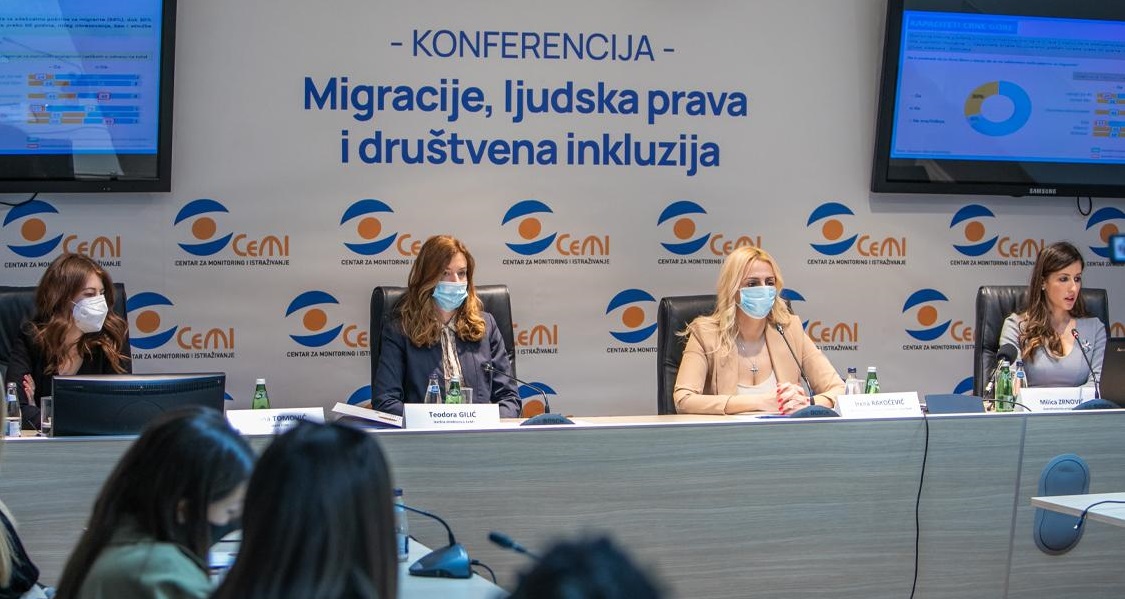The rule of law, strong institutions and good legislation is the foundation for adequate and humane management of migration, and in Montenegro half of the citizens have a neutral stance on the increasing number of migrants who enter the country, and two-thirds of them are not sure that the state is able to adequately take care of migrants.
This was announced at the conference " Migration, Human Rights and Social Inclusion ", which was organized by the Centre for Monitoring and Research ( CEMI ) in the framework of the project " Society without prejudice : solidarity to equality and inclusion ."
Coordinator of the project CEMI, Milica Zrnovic , said that the study of public opinion about the attitudes of citizens in relation to the situation of migrants in the Montenegrin society, showed that half of the citizens have a neutral stance on the increasing number of migrants who enter the country while only 11 percent of citizens have a positive opinion when migration is in question .
" About two thirds of Montenegrin citizens are not convinced that the state is able to adequately take care of migrants. When it comes to the impact of migrants on certain social aspects, 41 percent of citizens have a negative opinion about the impact of migrants on national and local culture. When it comes to the rate of criminality six out of 10 citizens of Montenegro believes that the presence of migrants increases criminality in society, " said the Zrnovic.
When it comes to the economy, as she stated, almost 60 percent of citizens take a negative attitude, 28 percent believe that there is no impact, and only six percent of respondents believe that the presence of migrants contributes to the country's economy.
As many as 85 % of citizens are not aware of the rights of migrants.
" Approximately 80 percent of citizens believes that the number of migrants in their environment is not too large, and three -quarters of citizens considered it necessary to limit the number of migrants who enter the country. However, 91 percent of citizens would assist this vulnerable group, especially when you have the issue of minors, " said the Zrnovic.
She said that 56 percent of citizens considers that employers in Montenegro should not employ migrants which was granted the status of asylum seekers, and which was given international protection, and 33 percent of citizens believes that migrants should not have the same rights as the citizens of Montenegro.
When it comes to the desire of the citizens of Montenegro to emigrate to other countries, 69 percent of them has said that it would never emigrate, while 27 percent would.
"In addition to public opinion research, we also conducted in - depth interviews with decision makers who are competent in this area. The research findings are an integral part of the Analysis we have published. In addition, we prepared a video, as well as a case study in which students who worked on this project participated." stated the Zrnovic.
IOM Montenegro project assistant, Bojana Tomovic, assessed that the rule of law, strong institutions and good legislation are the basis for adequate, humane and orderly migration management.
"It is very important that policies and projects, as well as data-based initiatives, have a human aspect and protection of human rights," Tomovic pointed out.
The head of the Directorate for the Reception of Foreigners Seeking International Protection, the Ministry of Internal Affairs of Montenegro, Irena Rakocevic, believes that everyone is obliged to avoid provisionalism and that it is important that there is a humanitarian aspect to migration at all times.
Rakocevic said that the migration system in Montenegro is completely regulated.
"What is the imperative of all state bodies is to enable foreigners residing in Montenegro to enjoy basic human rights in full capacity. Unfortunately, the facts show that exercising these rights is much more difficult for this category of persons. "These people, unlike everyone else, are very often deprived of their basic human right by birth, and that is the right to freedom of choice," said Rakocevic.
She pointed out that the Law defines institutes that are very important, and one of them is the institute of the grace of doubt, which is applied in the procedure of deciding on a request for international protection or subsidiary protection.
"This means that when a foreigner presents personal data that can be determined to be true, all other facts that are presented and that cannot be verified, the body that makes the decision, is obliged to interpret in his favor. I will mention another institute of classic refugee law, and that is the ban on the expulsion of a foreigner, regardless of how he entered the country, "Rakocevic explained.
The project “Society without Prejudice: Solidarity to Equality and Inclusion” is implemented by CeMI with the support of the International Organization for Migration (IOM) within the project “Regional Support to Protective and Sensitive Migration Management in the Western Balkans and Turkey (IPA II Funds).
